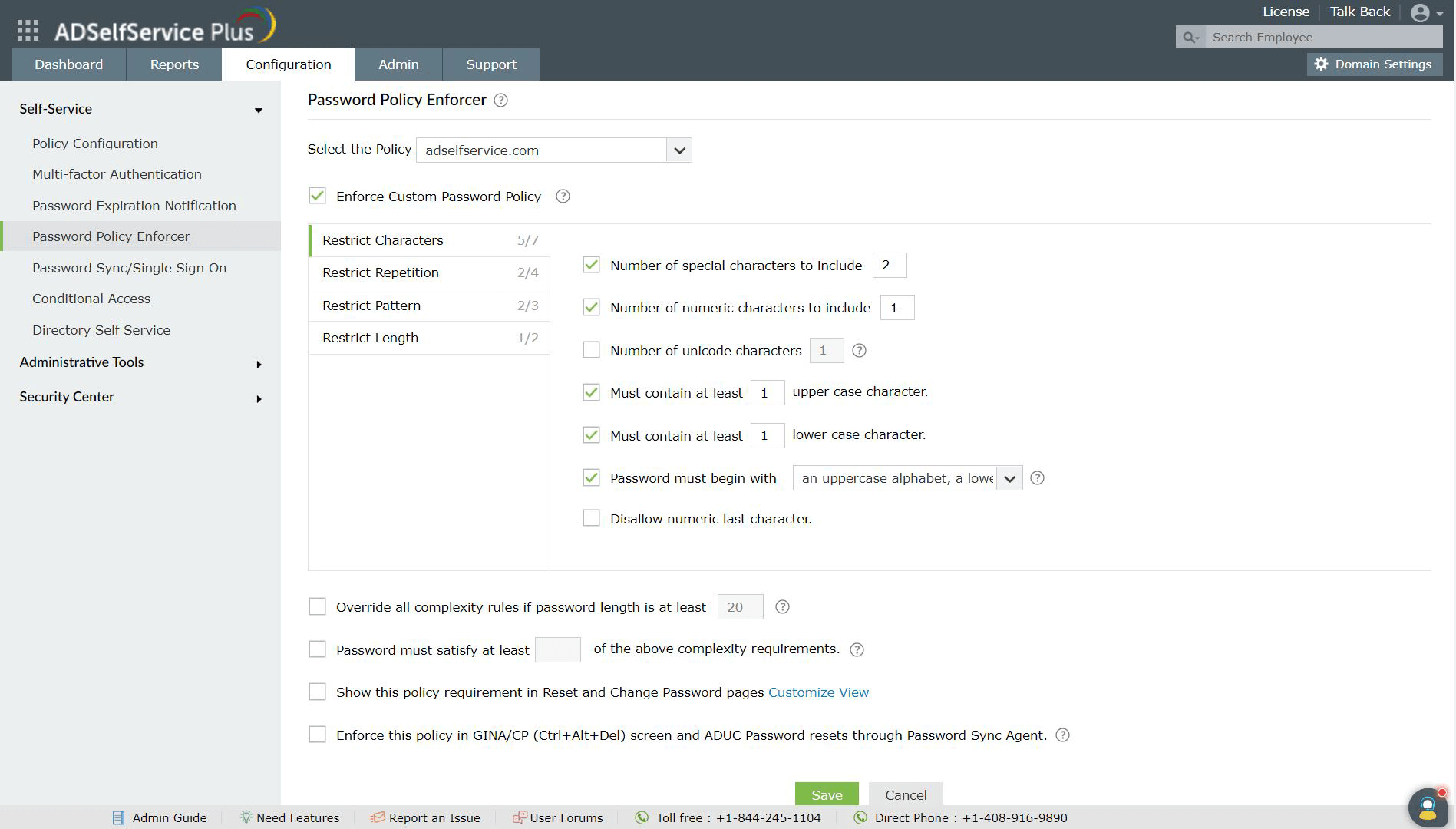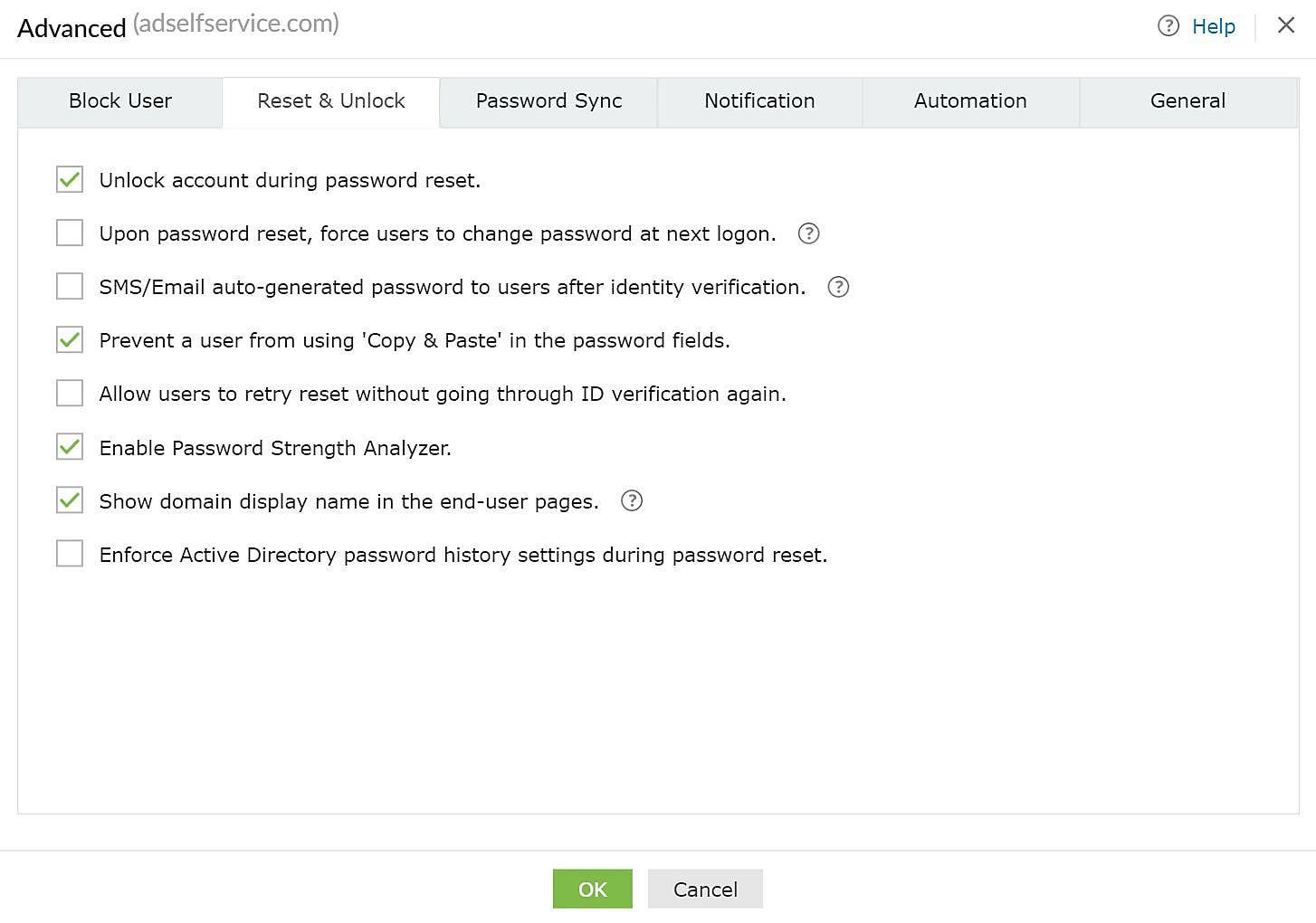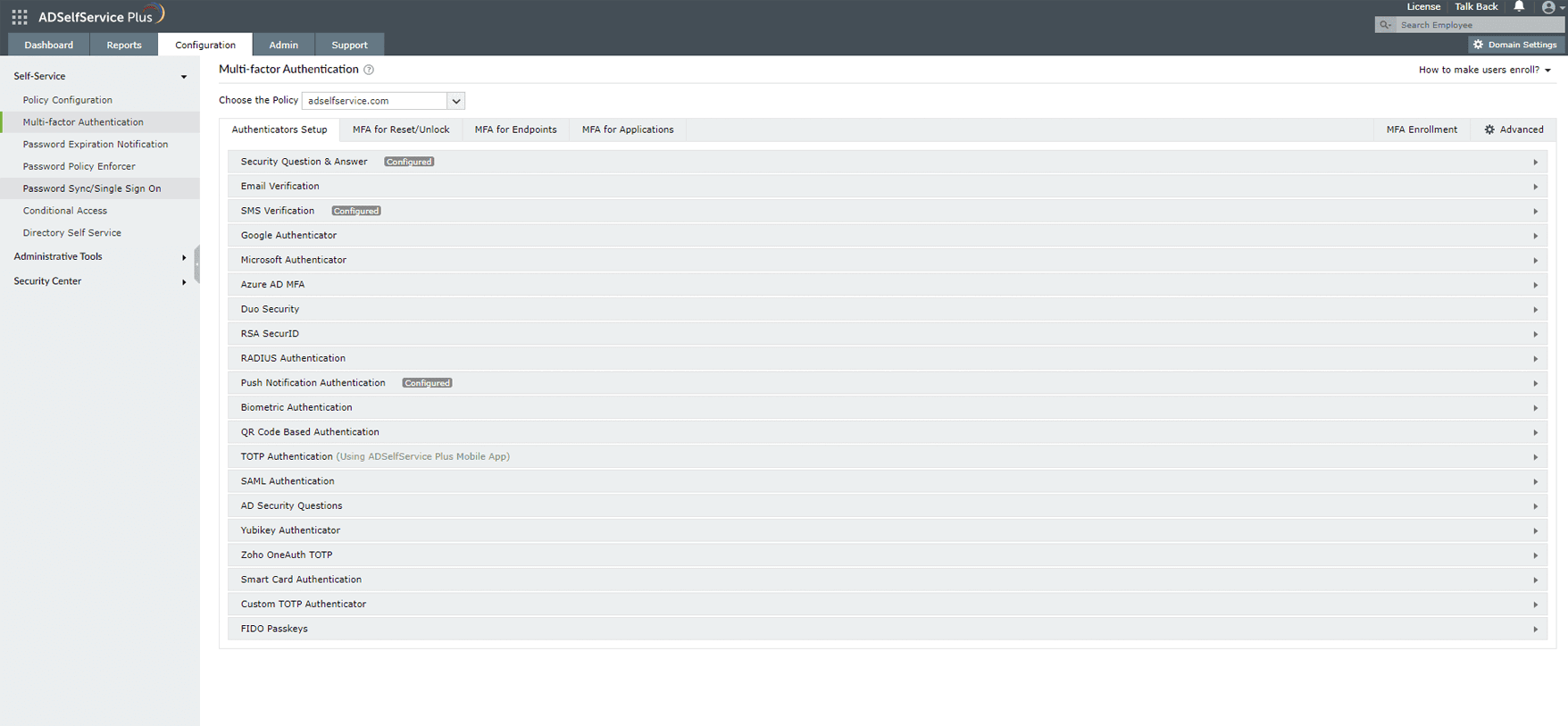- Free Edition
- Quick Links
- MFA
- Self-Service Password Management
- Single Sign-On
- Password Synchronizer
- Password Policy Enforcer
- Employee Self-Service
- Reporting and auditing
- Integrations
- Related Products
- ADManager Plus Active Directory Management & Reporting
- ADAudit Plus Real-time Active Directory Auditing and UBA
- Exchange Reporter Plus Exchange Server Auditing & Reporting
- EventLog Analyzer Real-time Log Analysis & Reporting
- M365 Manager Plus Microsoft 365 Management & Reporting Tool
- DataSecurity Plus File server auditing & data discovery
- RecoveryManager Plus Enterprise backup and recovery tool
- SharePoint Manager Plus SharePoint Reporting and Auditing
- AD360 Integrated Identity & Access Management
- Log360 (On-Premise | Cloud) Comprehensive SIEM and UEBA
- AD Free Tools Active Directory FREE Tools
Password security and data compliance
Businesses are responsible for storing and sharing information properly. Dire events, like Yahoo's massive data breach, which resulted in millions of users' sensitive information being compromised, highlight why business owners are worried about data security within their organizations.
A data breach not only puts users' privacy at risk, but also irreversibly impacts a company's finances and reputation. This is why businesses need to adhere to compliance mandates like the GDPR, NIS2 Directive, PCI DSS, and HIPAA to keep their data safe, and that's where ADSelfService Plus comes in.
Password security best practices
Data compliance regulations are regularly revised, taking insights from password cracking experts, cybercriminal behavior, and previous breaches. Here's what the regulations have to say about password security best practices:
| Compliance regulation | Description | Authentication and password security guidelines |
| GDPR | The GDPR was enacted by the European Union and it focuses on regulations to properly collect, store, and handle individuals' personal and sensitive data. |
|
| HIPAA | HIPAA includes standards to safeguard the health information of individuals that is handled by any business, institute, or agency. |
|
| PCI DSS | The PCI DSS includes regulations that businesses handling sensitive cardholder data must comply with. |
|
| Essential Eight | The Essential Eight is comprised of baseline mitigation strategies put forth by the Australian government to amp up the cyberdefense of organizations. |
|
| CJIS | The CJIS, a division of the FBI of the US, sets standards and appropriate controls to protect, transmit, store, and access criminal justice information. |
|
| SOX | The SOX act was enacted by the US government to safeguard shareholders and the public from accounting errors and fraudulent activities in organizations. |
|
| NIST | The NIST standard is the most influential, recommended standard for creating strong passwords that cannot be hacked. |
|
| NIS2 Directive | The NIS2 Directive , built on the original Network and Information Security (NIS) Directive, aims to standardize cybersecurity measures across the EU to combat growing cyberthreats . |
|
| UAE IAR (NESA) | The UAE IAR (NESA) includes standards to protect UAE's critical information infrastructure (CII) from cyberthreats. |
|
| NCSC | The National Cyber Security Centre (NCSC) is the UK's authority on cybersecurity, emphasizing password length, memorability, and blocking weak passwords rather than relying on complex character requirements. |
|
| DoD | The Department of Defense (DoD) is the United States federal agency responsible for national security and managing the armed forces, enforcing stringent policies to protect information systems and data from unauthorized access. |
|
| CMMC | Cybersecurity Maturity Model Certification (CMMC) is a unified framework developed by the U.S. Department of Defense to ensure contractors handling Controlled Unclassified Information implement robust cybersecurity practices across three certification levels. |
|
| DFARS | The Defense Federal Acquisition Regulation Supplement (DFARS) is the Department of Defense's (DoD's) additional cybersecurity requirements that go beyond standard government contracting regulations, establishing Clause 252.204-7012 to protect Controlled Unclassified Information for defense contractors. |
|
How ADSelfService Plus helps with password security and compliance
Password policy enforcer
- Allows you to enforce a custom password policy that integrates with the built-in AD password policies.
- Helps enforce requirements like restricting dictionary words, patterns, and palindromes, and mandates the number of special, numeric, and unicode characters that must be used.
Access policy
- Allows you to define any number of self-service policies in a given domain.
- Provides options to restrict the number of failed identity verification attempts, limit the self-service password reset frequency, enable CAPTCHA code verification during logins, analyze password strength, and more.
MFA
- Offers MFA support for application access, both cloud-based and on-premises, as well as for endpoints.
- Offers 20 different authentication factors, including: FIDO passkeys, biometrics, Duo Security, TOTPs, YubiKey, and smart cards.
An enhanced, user-friendly console that eases your IT burdens
Password Policy Enforcer
Advanced fine-grain capabilities
Assign fine-grained password policies to users belonging to different groups and OUs as needed.
Customize complexity requirements
Choose the minimum number of complexity requirements your users' passwords should satisfy as per your organization's security needs.

1. Advanced fine-grain capabilities: Assign fine-grained password policies to users belonging to different groups and OUs as needed.
2. Customize complexity requirements: Choose the minimum number of complexity requirements your users' passwords should satisfy as per your organization's security needs.
Access policy
Unique passwords
Enforce AD password history settings during password resets to restrict the use of old passwords.
Ctrl+C and Ctrl+V
Allow or prevent copying and pasting passwords in password fields.

1. Unique passwords: Enforce AD password history settings during password resets to restrict the use of old passwords.
2. Ctrl+C and Ctrl+V: Allow or prevent copying and pasting passwords in password fields.
MFA
Ample authenticators
Choose from 20 different authenticators to setup MFA for your users.

1. Ample authenticators: Choose from 20 different authenticators to setup MFA for your users.
Benefits of using ADSelfService Plus for password compliance
- Compliance with regulatory standards
Ensure your organization complies with NIST SP 800-63B, PCI DSS, NIS2 Directive, CJIS, SOX, GDPR, and HIPAA compliance mandates.
- Simplified auditing and tracking
Give administrators a holistic overview of their users' password and account statuses through several comprehensive reports and make data collection for legal auditing easy.
- Flexibility and security
Create different policies tailored to different users based on their level of access to sensitive data. Implement breached password protection to encourage strong, cyberattack-resistant passwords.
- Control and consistency
With approval-based self-service, give admins control over users’ self-service actions and ensure that they are handled in a secure, consistent manner.
Highlights of ADSelfService Plus
Password self-service
Unburden Windows AD users from lengthy help desk calls by empowering them with self-service password reset and account unlock capabilities.
Multi-factor authentication
Enable context-based MFA with 20 different authentication factors for endpoint, application, VPN, OWA, and RDP logins.
One identity with single sign-on
Get seamless one-click access to more than 100 cloud applications. With enterprise single sign-on (SSO), users can access all their cloud applications using their Windows AD credentials.
Password and account expiry notifications
Notify Windows AD users of their impending password and account expiry via email and SMS notifications.
Password synchronization
Synchronize Windows AD user passwords and account changes across multiple systems automatically, including Microsoft 365, Google Workspace, IBM iSeries, and more.
Password policy enforcer
Strong passwords resist various hacking threats. Enforce Windows AD users to adhere to compliant passwords by displaying password complexity requirements.










